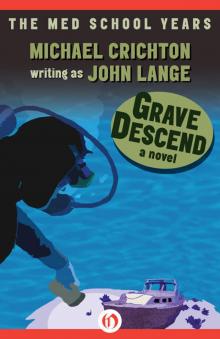- Home
- Michael Crichton
Grave Descend Page 2
Grave Descend Read online
Page 2
“Where did you sail from Palm Beach?”
“To Bimini. Captain Loomis said he wanted a shakedown cruise. He didn’t seem very confident in the boat, for some reason. So we went to Bimini, and stayed overnight, to take on supplies.”
“Supplies?” McGregor thought she must mean fresh water; the trip from West Palm to Bimini was too short to require anything else, and Bimini was an expensive port for most other supplies; a wise captain would wait for Nassau or Freeport.
“Yes. There was some furniture and things, for the cabins.”
“Furniture?”
“Yes. So we picked that up, and went on to Nassau.”
“The trip was uneventful?”
“Yes. We had one cloudy day, that was all.”
“No mechanical trouble?”
“We never had any mechanical trouble,” she said, “right to the end.”
“And from Nassau …”
“We went to Jamaica directly. No stops. It was perfect weather, just delightful. And we arrived in Jamaica three days ago.”
“Where did you pass customs?”
“Customs?”
“Yes. You had to pass Jamaican customs at your first port of call.”
“You mean where the little inspector came and asked if we had firearms and stuff?”
“That’s it.”
“In Ocho,” she said. “Right here.”
“This was your first stop?”
“Yes,” she said.
McGregor nodded. “Go on.”
“Well, we went to the … east, is it? Yes, east. From Ocho along the coast. We were going to park off the shore near where Robert has his house. He has a house further along the coast, you see. We were going to stop there and wait for him to fly down. Captain Loomis got us there yesterday afternoon, and we parked—”
“Moored,” McGregor said.
She gave him a dazzling smile. “I really don’t know much about boats. Yes, we moored offshore. I wanted to go closer but Captain Loomis said there were reefs, we couldn’t go any closer than we were. So we anchored there, and I spent the rest of the afternoon in the sun. And then suddenly I was in the water, and the ship was sinking. Just like that!” She snapped her fingers.
“There was an explosion?”
“I don’t really know,” she said. “I’ve been trying to remember it, but it happened so fast … I think there must have been an explosion, at least some kind of noise. And the next thing, I was in the water, and Captain Loomis was getting us away because he said there was suction around a sinking boat, and I started to get scared then. It was very scary. I would have been more scared if I really knew what was happening, but I didn’t, I was dazed.”
“No one was injured by the explosion?”
“No. That was lucky. Captain Loomis was very worried about it all. When the fishermen picked us up, he paid them a lot of money—a hundred dollars each—to keep quiet. I didn’t understand what the fuss was, until later. Then I understood that Robert had given him instructions about me. Robert’s worried about his wife, you see. She has all the money, and he’s worried she’ll divorce him.”
“So you were picked up by fishermen,” McGregor said. “What time was that?”
“I don’t know. About six. It was starting to get dark. We were taken ashore and we went to Robert’s house. We found clean clothes there—even a dress for me—and suitcases and stuff, and Captain Loomis had us all check into hotels. And he called Robert’s brother in Chicago, the insurance man, who flew down last night. He’s very nice—have you met him?”
“Yes,” McGregor said.
He frowned.
“Is something wrong?” Monica said.
“No,” he said. “Nothing.”
Walking back to his bike, he lit a cigarette and tried to put things together. Something wrong? Christ, nothing was right. He ticked off the points in his mind:
Wayne. If he was really a marine insurance investigator, he was either very inexperienced, or very dumb.
The charts. The position of the ship had been marked by a cross. Normally a presumed site was located by a broad circle, as much as a quarter of a mile in diameter. Never a cross—never so exactly.
The story. Granted that Monica Grant was an exceptionally attractive girl, even granted the need to keep the sinking out of the Pittsburgh papers, how did one keep it out of the Jamaica papers? Jamaica was a large island in some ways—one hundred and fifty miles by fifty miles, with Kingston the largest English-speaking port south of Miami—but in other ways, it was small. News traveled fast and irrepressibly. The daily Gleaner was a small, eccentric but proud newspaper, with a reputation for reporting everything worthwhile that happened on the island. How had Loomis managed it?
How could you keep the sinking of a luxury yacht a secret, even for twenty-four hours?
It seemed impossible. But then, in his fourteen years on Jamaica, McGregor had done quite a bit of salvage work, and he had heard enough stories to go with wrecks to realize that anything was possible. Especially in the realm of stupidity. Men wrecked boats who had never sailed before; they wrecked them by putting them into reverse when they thought it was forward; they wrecked them by not paying attention to charts (“A chart? You mean those map things?”); they wrecked them by getting drunk and falling asleep at the rudder; they wrecked them by letting the ships drift while they played games with girls in staterooms …
Every story was different, and they were all, to his ears, improbable. But not like the Grave Descend. That was not merely improbable; it was weird. Even the name of the ship was weird. He had meant to ask Wayne about the name of the ship.
No matter, he thought. He would ask the captain, Loomis.
3
THE TOWN OF OCHO RIOS was nothing much. An intersection, a couple of gas stations, a few bars and tourists shops, and you had passed it all. The organization of the town was simple and straightforward: a road ran along the coast, cut into the hills which climbed high from the beaches. On the coastal side of the road were the hotels, the money, the polish, the tourists. On the mountain side of the road were the native quarters, the huts and shacks and naked children.
And the Hotel Reserve.
The Hotel Reserve was a two-story frame building, painted pink, and flaking. In a way, it had its own dilapidated charm, but McGregor knew that it was pure business inside. The top floor was rented out to yacht crews; the ground-floor rooms were kept vacant, so that the studs who picked up women in the bars downtown could bring them back for a quick taste of native rhythm.
He parked his bike and went inside; he was directed upstairs, to Loomis’s room. He knocked, and a grumbling voice said, “Who the hell is it?”
McGregor waited, saying nothing. After a moment, he knocked again. There was a pause, and Loomis opened the door a crack.
“Yeah?”
“My name’s McGregor. I want to talk to you about the Grave Descend.” “What about it?”
“I’m the diver.”
“Oh.”
Frowning, Loomis opened the door wider. He was a burly man wearing undershirt and shorts, smelling of whiskey. The air in the room was stuffy as McGregor entered.
It was a simple room, with only the expected furnishings: bureau with cracked mirror, washbasin, dilapidated bed, tired-looking black girl in the bed.
Loomis turned to the girl. “Beat it, sweetie,” he said. “Time to go.”
The girl started to dress. Loomis ignored her, going to a small table on which sat a bottle of rum and two dirty glasses. He poured himself a shot and gulped it back, shivering.
“Ugh,” he said, staring out the dusty window at the children playing in the street below. “Hell of a way to wake up. What’d you say your name was?”
“McGregor.”
“Good to know you, McGregor,” Loomis said, extending a damp palm. They shook hands. “Want a belt?”
“No thanks,” McGregor said.
“Hell. Do you good.” He poured two shots, and gave
a glass to McGregor. “Bottoms up.”
The girl finished dressing, putting on a shiny green dress, very tight. She paused at the door.
“Talk to you later, sweetie,” Loomis said. “Now beat it.”
She left. Loomis sighed and sat on the bed. “Christ,” he said, “I feel awful. You talk to Wayne?”
“Yes.”
“Nice fella. He didn’t say all the things he could have said. Very practical fella. You know, it’s a hell of a mess. One roaring hell of a mess. But Wayne didn’t give it to me.”
He took a long swallow of the rum.
“I’ll tell you though,” he said, scratching his stubbly chin, “I’m worried about one thing. Guys like Wayne, real nice and polite, they can get you, know what I mean? Like the way I figure it, they need me now. They really need me. So they’re pleasant, right? But when they don’t need me any more …” He shrugged, finished the drink, and poured another. “Drink up,” he said.
McGregor took a sip of the rum. It was raw and thick, very cheap.
“I don’t mind telling you,” Loomis said, “I’m plenty scared. I blew it, and I’m scared.”
“How’s that?”
“Well, the owner, Robert Wayne, gives me a call in West Palm. Long-distance call. And all he has to say is that nothing better go wrong—and particularly nothing involving the girl. Now I know a little about the guy, and I know his position, right? He’s supposed to be this big steel executive, but that’s horseshit. He makes maybe sixty, seventy thou—which is okay, but it doesn’t keep you in yachts or stuff like Monica. You need like two hundred thou for that. So where’s it come from? His wife, I figure. His wife has the bread and he’s scared she’ll find out he’s hustling these chorus girls, so he calls me, long distance, to make sure no word gets out.”
Loomis sighed and shook his head.
“So I tell him, real confident, that no, nothing will happen, just relax. I tell him, and he says okay, fine, and hangs up. Then the next day, the girl arrives. You seen her?”
“Yes.”
“So you know why the hell old Wayne doesn’t want his moneybags wife to get wind of her. Newspapers dig up some picture of her in a bikini and it’s all over, man. All over. Good-bye, two hundred thou.”
McGregor nodded.
“So anyhow, the girl shows up, and we take the boat out. I wanted to—”
McGregor said, “Did you bring it across the Atlantic to West Palm?”
“No, no. That transatlantic stuff is big time, they got a special crew to do it. The boat used to be Australian, you see. Australian flag. It was built in Japan in 1961, and sold to some guy in Sydney. Then Wayne bought it last year, and had it shipped to the Mediterranean. He kept it in Monte Carlo or someplace, used it for entertainment and so on. Changed the name.”
“It’s an unusual name.”
“Damned spooky name, you ask me. Grave Descend. That’s a hell of a name for a ship. But you know what it is, it’s what all these new guys do with ships. Give them screwy names. You see those power-boaters in Miami, they name their ships Wet Dream and Sea Pussy and stuff like that. Think it’s funny.”
“You took command in West Palm?”
“Right. I’m not doing much there, managing a little overhaul for one guy or another, and I get this offer to skipper a ship for a guy in Pittsburgh. He wants me to put together a crew and run him down to Aruba, or maybe Venezuela. I say what the hell, sure. The price is right, too, let me tell you. Damned generous price.”
“You’d never seen the ship before?”
“No. It came in from Naples. That was its last port before coming over. Had a little outfitting done, some nice gold fixtures, and some huge goddamned sculpture in the main stateroom. Modern sculpture, all chrome. Then it was brought over here, and I picked it up.”
“And repairs were made?”
“Well, no, not repairs. We just checked it out. It was overhauled in Naples, they did a fine job. We just checked it out.”
“When did you sail?”
“The second of the month. We were supposed to be down here on the eighteenth, you see, and I wanted plenty of time, in case we had a snag. We went to Bimini, a kind of shakedown, getting the feel of things, putting the crew together—”
“The crew was new, too?”
“Yeah. Miami boys. You can always get a crew in Miami. Mostly the old lifeguards, too old to work the stud business, they crew out.”
“I see.”
“So we went to Bimini, and we picked up some ballast—”
“Ballast?”
“Yeah. Funny thing, the ship was listing some to port, not much, but it was off. So we trimmed her up and went on.”
“Why was it listing?”
Loomis shrugged. “Just the personality of the boat, you ask me. They’re all a little different.”
“And from Bimini?”
“Nassau. Supplies, food, water, stretch the crew’s legs. We were going very fine, and came directly down to Mo Bay.”
“Montego?”
“Right. Had customs there, no problems—”
“You passed customs in Montego Bay?” McGregor said.
“That’s right. Why?”
McGregor said, “Nothing.”
“It was logical. First port, and they’re better equipped at Mo Bay than Ocho. Hate to wait around for customs, you know, just waiting there for some damned uniformed flunky.”
“How long were you in Montego Bay?”
“About six hours. Then we sailed east to Ocho, and arrived two days ago. Yesterday we went further east to Silverstone. That’s about fifteen miles east of Ocho; it’s a promontory, you may have seen it. House out there that Mr. Wayne owns, called Silverstone. We were supposed to anchor there and wait for him. He was going to fly down at the end of the week.”
“And?”
Loomis took another drink. “Christ, I don’t know. I swear I don’t know. We were running that ship beautifully. The crew was careful. Nobody was smoking below decks—in fact, the guy I put on the engines didn’t smoke at all, he was a non-smoker. But somehow it happened.”
Loomis finished his drink and poured himself a still larger slug.
“I’m forward, on the bridge actually, when it happens. I feel the ship rock—sort of jump—and I hear the sound. It wasn’t very loud, like a rumbling, but it must have blown out the stern or maybe half the underplates because right away she started to go down.
The people on the stern, like Miss Grant—she was sunbathing on the stern—they were knocked into the water. The rest of us on board were going to throw them life preservers when we realized just how fast the boat was going. It was really going fast. But peaceful, you know. Like a rock settling in.”
“What did you do next?”
“Well, look, I’m no hero. I got the hell off. Besides, it was going so fast, I was afraid it would suck the others down, they didn’t know anything about moving off from a sinking ship. I managed to get everybody clear, and the ship went. Stern first, but it was all pretty fast.”
“And then?”
“Then we made for shore, doing the best we could. A fishing boat saw us and picked us up. I paid the boys off pretty good. By then I was thinking, you see, about what had happened, and what it all meant. I decided to get smart. I took everybody up to Silverstone, got them into fresh clothes. We took the car at the house and drove into town. I put the girl into a hotel, and the crew here. And then I called Arthur Wayne.”
“Why him?”
“Owner’s instructions. On the phone, Robert Wayne says to me, anything goes wrong, don’t call me, call my brother Arthur in Chicago. So I did.”
“And he flew right in?”
“Boy, did he,” Loomis said. “Came in by private jet last night. And he right away figured out what to do.”
“About the wreck?”
“About the girl. He knew we’d have to report it sooner or later, so he figured out this plan where we’d report it today.”
“I se
e.”
“I get the crew together, and we go out there about five o’clock, and swim ashore, and call the cops. Pretty neat, huh?”
“But someone must have seen the ship go down yesterday.”
“Not out there. It’s a pretty deserted stretch. Only people that know are me and the crew, the girl, the two fishermen, the maid at Silverstone, and the hotel people here. And they’ve all been paid. Pretty well, too.”
“Very neat.”
“You’re telling me. Only one thing bothers me: once this is all over, what happens?”
“How do you mean?”
“I mean,” Loomis said, “what happens to me? I got them into this big fix, and it’s real expensive. What’re they going to do to me?”
“I don’t know,” McGregor said.
“Neither do I,” Loomis said, “and I’m worried plenty.”
4
THE COCKATOO WAS A BAR west of town, a shanty where the steel bands played at night, and the natives sang songs about the big bamboo while the lady tourists fluffed their dresses, drank their rum punches, and waited to get picked up. During the day it was dark, cool, and quiet.
McGregor found Sylvie there, leaning against the bar, talking with some of the boys from the band. She wore stretch slacks and a tight blouse; the boys were definitely interested.
McGregor slapped her bottom as he came up. “Hello, love.”
She smiled and kissed his cheek. The boys looked envious.
Sylvie was French, originally from Martinique. She had come to Kingston three years before, to study at the university; that was where McGregor had met her. Sylvie was a former Miss Martinique, and she did great things for clothes, particularly tight clothes.
“I just arrived,” she said. “How long have you been here?”
“Since eight thirty.”
She made a clucking sound. “You drive too fast. What’s it about?”
He explained the sinking of the Grave Descend. Sylvie wrinkled her nose and brushed her long black hair back from her face. “What an awful name.”
“It’s an awful story. Everybody trying to cover up for the mistress.”

 Dragon Teeth
Dragon Teeth Jurassic Park
Jurassic Park Micro
Micro The Great Train Robbery
The Great Train Robbery The Andromeda Strain
The Andromeda Strain The Lost World
The Lost World Congo
Congo Travels
Travels Timeline
Timeline Sphere
Sphere Westworld
Westworld Prey
Prey State Of Fear
State Of Fear Next
Next Disclosure
Disclosure Pirate Latitudes
Pirate Latitudes The Terminal Man
The Terminal Man Five Patients
Five Patients Rising Sun
Rising Sun Binary
Binary The Andromeda Evolution
The Andromeda Evolution Airframe
Airframe Easy Go
Easy Go Drug of Choice
Drug of Choice Odds On: A Novel
Odds On: A Novel Scratch One
Scratch One Dealing or The Berkeley-to-Boston Forty-Brick Lost-Bag Blues
Dealing or The Berkeley-to-Boston Forty-Brick Lost-Bag Blues Venom Business
Venom Business Grave Descend
Grave Descend Gold - Pirate Latitudes
Gold - Pirate Latitudes Binary: A Novel
Binary: A Novel Zero Cool
Zero Cool Delos 1 - Westworld
Delos 1 - Westworld